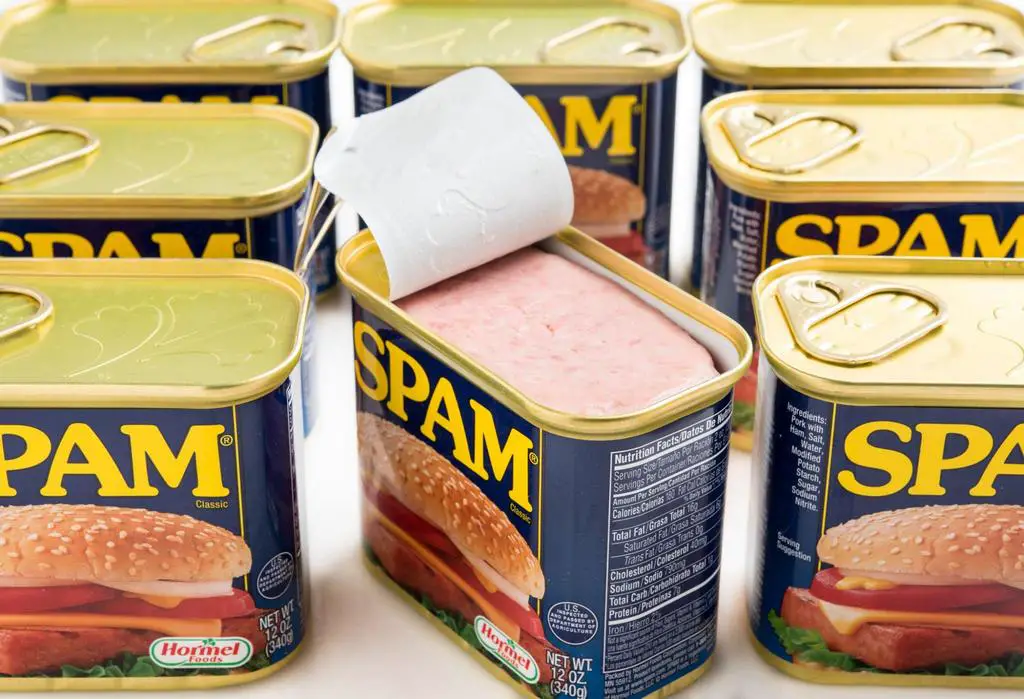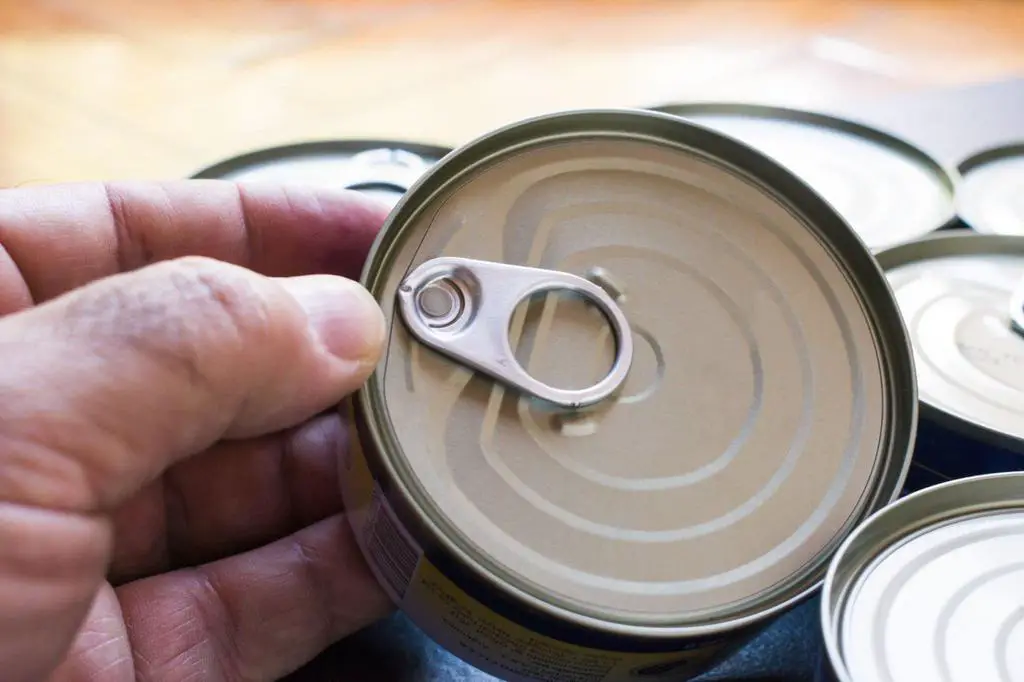Are Spam Cans Recyclable? What Are They Made Of?

In a world that’s more eco-conscious than ever, the items we toss into our recycling bins are part of our daily sustainability puzzle. You might have wondered about that sturdy little container that once held your favorite canned meat, Spam.
So, are spam cans recyclable, and what exactly goes into making them? Spam cans are recyclable. All metal cans, including steel and aluminum, are infinitely recyclable.
Let us figure out what these round containers are for and see how they get from your pantry to the recycling center.
What’s inside a spam can is only part of the story; it’s the can itself that often captures our attention. These metal marvels have a role in our lives that goes beyond their initial purpose, and understanding the recyclability and composition of spam cans can help us make more informed choices.
So, join us on this exploration as we delve into the world of recycling, sustainability, and the simple yet fascinating science behind what Spam cans are made of.
What Are Spam Cans, and Why Are They a Concern?
Spam cans, those ubiquitous metal containers that hold a variety of processed meats, may seem harmless at first glance. However, their impact on the environment is cause for concern.
Spam cans are typically made of tin-plated steel, which takes a significant amount of energy and resources to produce. This not only depletes our natural resources but also contributes to greenhouse gas emissions during the manufacturing process.
But it’s not just the production stage that raises alarm bells. The disposal of spam cans can pose several challenges as well. While they can be recycled in some regions, many end up in landfills, where they take years to fully decompose due to their non-biodegradable nature. Consequently, this adds to the already looming waste management crisis and further pollutes our environment.
Furthermore, spam cans are often lined with substances such as Bisphenol A (BPA) or BPS, which act as protective barriers between the metal and food contents but have been linked to potential health risks when consumed over time.
So not only do we need to worry about proper disposal methods for spam cans, but we also need to consider reducing our consumption of these processed foods altogether.
Are Spam Cans Recyclable?
The answer to whether spam cans are recyclable is a resounding “yes.” Most spam cans are made of materials that are fully recyclable, which is excellent news for the environment-conscious consumer. The primary materials used in spam can production are aluminum and steel, both of which are highly recyclable.
Aluminum is also highly recyclable, which is good news for those concerned about the environmental impact of spam cans. In fact, aluminum is one of the most commonly recycled materials worldwide due to its endless ability to be reused without losing any of its properties. Therefore, the next time you empty a can of spam, remember to recycle it and transform it into something new.
Recycling Aluminum Spam Cans

Aluminum spam cans are not only recyclable but are among the most sought-after recyclables. Aluminum is known for its infinite recyclability, which means it can be recycled over and over again without losing quality.
The recycling process for aluminum involves melting it down and reshaping it into new products, which significantly reduces energy consumption compared to producing aluminum from raw materials. To recycle aluminum spam cans:
- Clean the Can: Rinse out any remaining spam residue and remove any paper labels or plastic covers.
- Drop It in the Bin: Place the cleaned aluminum spam can in your recycling bin. Be sure to check with your local recycling program to ensure they accept aluminum cans.
- Collection and Processing: The recycling facility collects the aluminum cans, melts them, and forms new products, such as new cans, bicycle frames, or even airplane parts.
By recycling your aluminum spam cans, you’re not only reducing landfill waste but also conserving energy and resources.
Related: Why Did People Stop Using Aluminum for Pots and Pans?
Recycling Steel Spam Cans
Steel spam cans are also recyclable, although the process is slightly different from aluminum. Steel is another durable and highly recyclable material commonly used for food packaging due to its strength and resilience. Here’s how to recycle steel spam cans:
- Clean and Prepare: As with aluminum, ensure the can is clean and free from any food remnants or labels. Rinse it thoroughly to avoid contamination.
- Recycling Bin: Place the cleaned steel can in your recycling bin. Check with your local recycling program to confirm they accept steel cans.
- Processing: Recycling centers use powerful magnets to separate steel cans from other recyclables. The cans are then melted down and reused for various products, including new cans and construction materials.
By recycling steel spam cans, you contribute to the reduction of waste and the conservation of valuable resources.
What Are Spam Cans Made Of?
Spam cans are primarily made from two materials: aluminum and steel. Let’s take a closer look at each material and its properties.
Aluminum in Spam Cans
Aluminum is a lightweight, durable, and corrosion-resistant metal. It is often used for packaging due to its ability to protect the contents from external factors such as air and light. Here are some key characteristics of aluminum:
- Lightweight: Aluminum is about one-third the weight of steel, making it an ideal choice for packaging, especially for canned foods like spam.
- Corrosion-Resistant: It doesn’t rust or corrode, ensuring the integrity of the can’s contents.
- Highly Recyclable: Aluminum can be recycled endlessly, making it one of the most sustainable packaging materials.
Steel in Spam Cans
Steel is known for its strength and durability. It’s a popular choice for packaging items that require extra protection. Here are some characteristics of steel:
- Strength: Steel is incredibly strong, which makes it suitable for containing products that need protection, like canned foods.
- Recyclable: Steel is recyclable, though the process is slightly different from aluminum. It can be melted down and used to create various steel products.
- Longevity: Steel cans have a long shelf life and can keep their contents fresh for extended periods.
Environmental Benefits of Recycling Spam Cans
Recycling spam cans, whether they are made of aluminum or steel, offers several environmental benefits:
- Energy Savings: Recycling cans consumes significantly less energy than producing new ones from raw materials. This conserves valuable resources and reduces greenhouse gas emissions.
- Resource Conservation: Recycling extends the life of materials, reducing the need for mining and extraction of raw resources.
- Landfill Reduction: By recycling spam cans, you help reduce the amount of waste going to landfills, contributing to a cleaner environment.
- Economic Impact: The recycling industry supports jobs and contributes to the economy, making recycling an essential part of sustainable living.
Reusability of Spam Cans
When we talk about the reusability of spam cans, we’re diving into an intriguing world of recycling and repurposing. These unassuming canned food containers often found in our pantries can enjoy a second life, contributing to both our creative endeavors and the environment.
Have you ever looked at an empty spam can and thought about its potential beyond just holding the delicious canned meat product? The truth is, these cans can serve a variety of purposes beyond their original intent. From pen holders to plant pots, and even makeshift lanterns for cozy outdoor evenings, the possibilities are limited only by your imagination.
Creative DIY Projects Utilizing Recycled Spam Cans
To spark your creativity, here’s a list of some innovative ways to reuse spam cans in your next DIY project:
- Desk Organizer: Paint and decorate the can to create a stylish desk organizer for your pens, pencils, and small office supplies.
- Herb Garden: Transform a few spam cans into charming herb pots for your kitchen windowsill. They’re the perfect size for growing fresh basil, mint, or thyme.
- Candle Holder: Add a touch of warmth and ambiance to your home by using spam cans as candle holders. Customize them with intricate designs and patterns.
- Outdoor Lanterns: For your next backyard barbecue, place tea lights in painted spam cans to create enchanting outdoor lanterns.
- Mini Drum Set: Paint several spam cans and arrange them like a mini drum set for kids to enjoy some musical fun.
Economic and Environmental Benefits of Reusing Spam Cans
Repurposing spam cans isn’t just about flexing your creative muscles; it’s also about being eco-conscious. By giving these cans a second life, you reduce waste and save resources.
Moreover, recycling and reusing spam cans can lead to economic benefits by lowering your spending on home organization items or decor. It’s a win-win for your wallet and the planet. So, next time you finish that can of spam, consider the endless possibilities that await your creativity and the positive impact it can have on our environment.
Conclusion
In summary, spam cans are not only recyclable, but they are also made of materials, such as aluminum and steel, that are highly sought after in the recycling industry. By taking a few simple steps to clean and recycle your spam cans, you can contribute to energy savings, resource conservation, and a cleaner environment. So, the next time you enjoy a can of spam, remember to do your part for the planet by recycling the can responsibly.
FAQs Metal Can Recycling of Spam’s Can
How can I tell if a spam can is recyclable?
Check for recycling symbols or codes on the can. Generally, if a spam can is made of aluminum or steel, it is likely recyclable. Refer to your local recycling guidelines for specific instructions.
Are all parts of a spam can recyclable, including the label and lid?
While the body of the can is usually recyclable, the label and lid may not be. Check with your local recycling center to confirm which parts are accepted, as different facilities may have varying guidelines.
What are the environmental benefits of recycling spam cans?
Recycling spam cans helps reduce the need for raw materials, conserves energy, and decreases the amount of waste in landfills, contributing to a cleaner environment and the conservation of natural resources.
How can I encourage my community to participate in spam’s recycling programs?
Organize community workshops, offer incentives for participation, and educate about the environmental benefits of recycling. Collaborate with local authorities to provide accessible recycling facilities and information.
What is the most eco-friendly way to dispose of spam cans?
The most eco-friendly way to dispose of spam cans is to rinse them thoroughly to remove any leftover food, then place them in the appropriate recycling bin. This ensures the materials can be efficiently processed and reused.
Why are some spam cans labeled as non-recyclable?
Some spam cans are labeled as non-recyclable due to the complexity of their composition, including mixed materials or non-standard components that make it challenging or uneconomical for recycling facilities to process.






